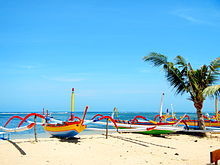Jukung
A jukung is a small wooden outrigger canoe from Indonesia . It is a traditional fishing boat that is also used to transport small groups of divers. In the Philippines, these boats are also known as Bangka .
Originally of Balinese origin, the double-jib canoes are just one of many Pacific-Asian boats that use a crab claw sail from Polynesia . Although these sails difficulties in turn prepares the wind and therefore a neck require, the Jukung behaves excellent at Anwindkursen . The boats are brightly decorated and have a marlin-like bow.
The locals on Borneo also call their boats Jukung. There it is used for daily commutes to the office, to school or for shopping at the Pasar terapung floating market.
The great jukung race
In the late 1980s, nine teams sailed a 1000-nautical-mile race in open jukungs across the Timor Sea from Bali to Darwin on Australia's north coast. The crews were from New Zealand, Australia, USA, England, Japan, France, Germany, the Netherlands and Indonesia. Bob Hobmann had devised, organized and filmed the three-month expedition as “Passage out of Paradise”. The National Geographic Society published a report entitled "The Great Jukung Race".
The expedition began in Bali, where the teams trained how to deal with the Jukungs. They then embarked on a two-month journey on the historic sailing routes along the islands to the east, which led them past the island of Komodo . They ended their trip with a five-day sailing trip across the Arafura Sea to Darwin. Challenges arose from storms and the resulting boat repairs, ingress of seawater, unfavorable currents and water eddies . For safety reasons, the crews did not sail against each other for the last stage, but rather as a group.
Web links
- Horst Leibner: Traditional Indonesian Boats - Department of Marine Affairs and Fisheries. 2002.
- A Jukung from Madura Island - Traditional Indonesian Trimaran
